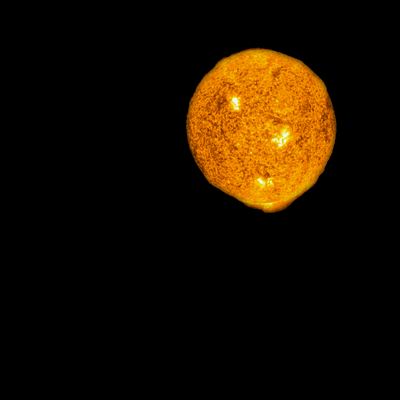In 2005, when I was a senior in high school and didn't know much about science, I was staring at the night sky and came to a realization:
If the Universe is infinite, then why isn't the whole night sky full of stars?
Think about it: If the Universe is infinite there there are infinite stars in infinite angles in relation to Earth. Therefore, the entire night sky should appear at least as bright as our own Star during the day. Don't understand what I mean? Look at this image, which represents what I'm talking about:
If the Universe is infinite, then why isn't the whole night sky full of stars?
Think about it: If the Universe is infinite there there are infinite stars in infinite angles in relation to Earth. Therefore, the entire night sky should appear at least as bright as our own Star during the day. Don't understand what I mean? Look at this image, which represents what I'm talking about:
I asked my 12th grade astronomy teacher if was I was thinking was right. She said that theoretically yes, but distance plays a role in brightness. I accepted that answer and moved on, until recently, when I thought about it again.
There is a proper name for this phenomena, it's called Olbers' Paradox. It is named after the German astronomer Heinrich Wilhelm Olbers and also called the "dark night sky paradox." It is the argument that the darkness of the night sky conflicts with the assumption of an infinite and eternal static universe. A static universe is a universe not expanding or contracting, but remaining the same.
So why isn't the night sky as bright as our Sun? Two theories when combined make sense.
The first reason essentially means that the Universe is not static, it's expanding (which is what I believe) and that light emitted from distant stars is slowly increased in wavelength down the visible spectrum to red and then out of the visible spectrum, making the light invisible to our eyes. It doesn't mean we can't pick up the energy through other means (infrared, radio, etc.) but we just can't see it with our eyes. So, in that sense, my teacher in 12th grade was very correct.
The second reason means that the Universe is not infinite, it's finite- it has an age, a size, and a finite amount of stars. However, even if there are so many stars in the Universe we still could not escape seeing ALL of their light, therefore making the night sky much brighter than it is. So what's the catch?
Estimates are that the Universe is somewhere around 13.7 billion years old. The catch is that light from stars that are more than 13.7 billion light years away (due to expansion) hasn't reached us yet and when it does the night sky will get brighter.
Honestly the whole concept is confusing but I hope I was able to explain it a little bit. The most important thing you should take away from this is that when someone says the Universe is infinite, you can ask them why, then, is the night sky not as bright as our own star. Something to think about!
Thanks for reading, and trying to understand.
There is a proper name for this phenomena, it's called Olbers' Paradox. It is named after the German astronomer Heinrich Wilhelm Olbers and also called the "dark night sky paradox." It is the argument that the darkness of the night sky conflicts with the assumption of an infinite and eternal static universe. A static universe is a universe not expanding or contracting, but remaining the same.
So why isn't the night sky as bright as our Sun? Two theories when combined make sense.
- The Universe is expanding, so light from distant stars is pushed out of the visible spectrum as the wavelength increases.
- The Universe is young and light from distant stars hasn't reached us yet.
The first reason essentially means that the Universe is not static, it's expanding (which is what I believe) and that light emitted from distant stars is slowly increased in wavelength down the visible spectrum to red and then out of the visible spectrum, making the light invisible to our eyes. It doesn't mean we can't pick up the energy through other means (infrared, radio, etc.) but we just can't see it with our eyes. So, in that sense, my teacher in 12th grade was very correct.
The second reason means that the Universe is not infinite, it's finite- it has an age, a size, and a finite amount of stars. However, even if there are so many stars in the Universe we still could not escape seeing ALL of their light, therefore making the night sky much brighter than it is. So what's the catch?
Estimates are that the Universe is somewhere around 13.7 billion years old. The catch is that light from stars that are more than 13.7 billion light years away (due to expansion) hasn't reached us yet and when it does the night sky will get brighter.
Honestly the whole concept is confusing but I hope I was able to explain it a little bit. The most important thing you should take away from this is that when someone says the Universe is infinite, you can ask them why, then, is the night sky not as bright as our own star. Something to think about!
Thanks for reading, and trying to understand.

 RSS Feed
RSS Feed
